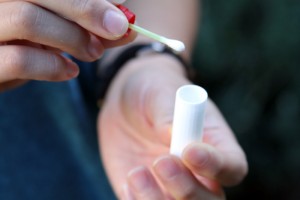Startup uBiome Will Catalog Your Microbes, Again and Again
Sequencing startup uBiome marked its next phase today with the launch of its new sales site where customers can order a swab kit for checking on the bacteria living in their gut, mouth, nose, genitals, or behind the ear.

More than 2,500 participants joined the group’s indiegogo campaign, which raised more than $350,000 (the largest crowdfunded campaign for citizen science project to date, according to the company). Now, new customers can order kits ranging from $89 (“Sequence Your Gut”) to $399 (“Sequence All 5 Sites”).
Microbial cells on our bodies outnumber our human cells 10 to one. Researchers estimate some 10,000 species of bacteria and other invisibles live in and on our body (see “Researchers Catalogue Your Microbial Zoo”), mostly as benign tenants. But our microscopic ecosystems can sometimes get out-of-whack and the overabundance or absence of different species has been implicated in diseases ranging from diabetes to depression (see “Transplanting Gut Microbes to Treat Disease”).
Changes in the microbiome can happen repeatedly over a person’s lifetime, which may mean that microbial sequencing will be a more profitable venture than human sequencing. uBiome hints at this in their press release today: “In contrast to the human genome, the microbiome can be modified and measured over time.” One of uBiome’s products is a kit to take samples of your gut bacteria (yes, poop) at three different times. Want to know what those antibiotics are doing to your gut flora? Do “living cultures” in yogurt actually change what’s happening inside? For $299, maybe you can find out.
Keep Reading
Most Popular
Large language models can do jaw-dropping things. But nobody knows exactly why.
And that's a problem. Figuring it out is one of the biggest scientific puzzles of our time and a crucial step towards controlling more powerful future models.
How scientists traced a mysterious covid case back to six toilets
When wastewater surveillance turns into a hunt for a single infected individual, the ethics get tricky.
The problem with plug-in hybrids? Their drivers.
Plug-in hybrids are often sold as a transition to EVs, but new data from Europe shows we’re still underestimating the emissions they produce.
Stay connected
Get the latest updates from
MIT Technology Review
Discover special offers, top stories, upcoming events, and more.